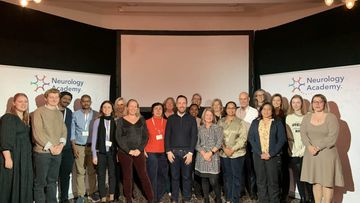An interview with Riffat Tanveer: this year’s Raising the Bar poster runner-up
NewsNeurologist Riffat Tanveer won the runner up award at this year’s Raising the Bar meeting for his poster looking at neurology trainee’s views on taking on MS as a subspecialty.
Riffat credits his own pursuit of MS as a subspeciality to an enthusiastic mentor who engaged him practically through active roles in clinics and patient management, and guided him to different sources of learning and understanding.
After discovering at the 2019 Raising the Bar meeting that he was just one of three trainees in attendance, he decided to find out why there were so few MS trainee specialists there, and what might be affecting trainees’ decisions to specialise in MS. His poster outlines the validated questionnaire he developed and his findings.
Riffat has been trialling a new way of working with trainees in his service to encourage interest and foster confidence in working in MS.
Riffat’s trainees follow a model that he is still tweaking, which currently combines a mixture of practical clinic work alongside him every other week with the trainee seeing patients on their own in the alternating week.
Trainees in his department also take a vital role in MDT meetings, from completing the relevant proformas for the MDT which helps them to understand the journey of the patient, to attending and presenting the case in the meeting.
We heard at this year’s Raising the Bar meeting in Jeremy Hobart’s overview of his workstream’s audit findings (day 1) that neurology trainees are rarely in attendance at MDT meetings, suggesting that this practice is uncommon, but could be a positive step for improving neurology trainee’s overall understanding of MS management, and potentially impact the uptake of MS as a specialism.
Riffat was very clear, however, that there is a balance to obtain between providing opportunity and mentorship, and overwhelming people.
Calls to action
This work has potential implications across the whole MS community and there are a number of ways that you could get involved.
An inclusive approach to training – building the next generation of MSologists
Are you keen to see more MSologists across the country? You could make a difference directly.
- Share your own enthusiasm: An enthusiastic mentor is one of the top reasons for choosing a specialism – you can be that mentor!
- Support independence and build confidence: Find ways to work with your trainees to both build knowledge alongside you, and have freedom to be responsible for elements of the service, such as running clinics with trainees as Riffat describes.
- Introduce the whole patient and the full care pathway: Getting trainees involved with MDT meetings, both completing MDT proformas and attending the meetings to share that case can help trainees understand the complete picture, the way services interlink, and the rationale for different outcomes.
If you are interested in modifying your training style to improve uptake of MS as a specialism in your trust, and you would like to work with Riffat to test models and record how they impact trainees in the long term, please get in touch with him.
Nurse specialists
Riffat is hugely aware that the uptake of MS as a specialism is not confined to consultant level. He plans to research why MS nurses are becoming scarce and what can be done to encourage nurses to specialise in MS.
Planning to pause until the pressure on services caused by COVID-19 settles down, Riffat is keen to then tackle this area. If you are an MS nurse and would be interested in helping him further this work, please get in touch with him via MS Academy.
Learning from other areas: nurse education
The challenges around developing new specialists is not confined to MS alone, and Parkinson’s Academy have recently begun creating an online-only Nurse MasterClass in Parkinson’s, developed by and for specialist nurses. MS Academy is currently exploring the nurse education programme for 2021, considering developing similar sessions through experienced MS nurses.
Related articles
Encouraging excellence, developing leaders, inspiring change
MS Academy was established five years ago and in that time has accomplished a huge amount. The six different levels of specialist MS training are dedicated to case-based learning and practical application of cutting edge research. Home to national programme Raising the Bar and the fantastic workstream content it is producing, this is an exciting Academy to belong to.


